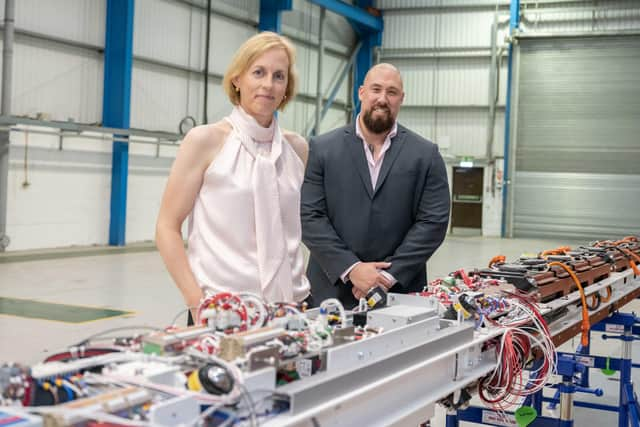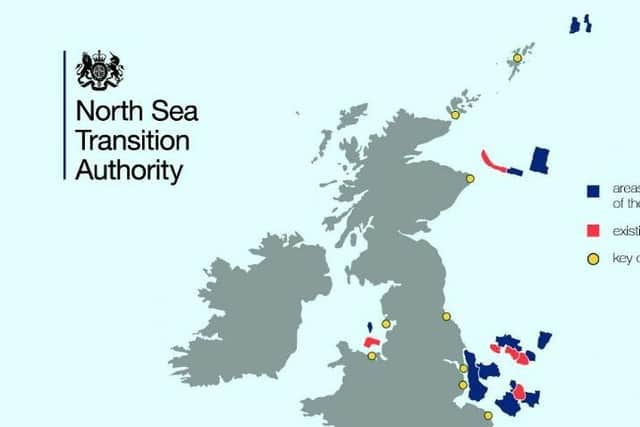North east Scotland and Shetland set to become centres for the UK’s burgeoning £100bn CO2 capture and storage industry
The study, by Offshore Energies UK (OEUK), a key deliverable of the 2021 North Sea Transition Deal, finds that the engineering and other skills developed in regions involved with the oil and gas industries mean they are ideally placed to become hubs for CO2 capture and storage (CCS).
Thousands of jobs could be created in such regions, focused on cities like Aberdeen, Inverness and Peterhead plus the Shetlands. The UK’s CCS industry is predicted to be worth up to £100 billion/year by 2050.
Advertisement
Hide AdAdvertisement
Hide AdIt follows a decision by the North Sea Transition Authority to include several areas off the coasts of Scotland and Shetland in its first-ever CO2 storage licensing round. The areas offered, 13 in total, lie off the coasts of:


Aberdeen, and Inverness in the Northern North Sea Shetland (in the Atlantic, northeast of the Shetland Isles) Liverpool and North Wales in the East Irish Sea Lincolnshire and north Norfolk in the Southern North Sea Teesside, in the Central North Sea
Carbon capture and storage (CCS) involves capturing CO2 emissions from burning hydrocarbons such as gas, petrol and oil. Currently most such CO2 is released into the atmosphere, but this accelerates harmful processes such as global warming and ocean acidification.
The aim of CCS is to capture the CO2 and transport it via ships or pipelines to be permanently stored deep underground in geological formations. Developing such technologies was a key element in the 2021 North Sea Transition Deal, under which the offshore energy industry committed to work with the UK government to achieve net zero by 2050.
In 2021, the UK government selected two industrial clusters – places where energy intensive industries are located close to each other – for the UK’s first CCS deployments. These are the Hynet cluster, based in northwest England and north Wales, and the East Coast cluster, made up of Zero Carbon Humber and Net Zero Teesside. A similar scheme, the Acorn Project, is planned for Scotland, based at the St Fergus gas terminal near Peterhead.


CCS has been recognised as a critical technology to help energy intensive sectors, like cement and power generation, cut emissions. The Government’s Net Zero Strategy says the UK will need to capture 50m tonnes a year by 2035. The concentration of companies and skilled workers already involved in the offshore supply chain in areas like northeast Scotland and Shetland means they are ideally placed to pioneer the UK’s CO2 CCS industries.
The new report, commissioned by the Department for Business, Energy and Industrial Strategy (BEIS) and produced by OEUK, finds that offshore oil and gas supply chain companies already have good capabilities in areas including plant design and engineering, some types of plant fabrication, and construction.
It identifies 13 actions through which government and industry could help the sector grow, including early-stage funding from government, the awarding of more CO2 storage licenses and collaboration between companies on fabrication, storage and transport facilities.
Other findings include:
Advertisement
Hide AdAdvertisement
Hide AdCCS could be worth £20bn to the offshore supply chain in the next ten years, and £100bn by 2050. Thousands of new ‘green’ jobs could be created by CCS development and implementation. The UK already has most of the components necessary for a successful CCS sector, including: A big potential market for exports of technology and expertise Large industrial clusters capable of handling high volumes of gas Extensive gas transport infrastructure A good scientific understanding of the geological requirements for long-term CO2 storage
However, the report also warns that the UK supply chain is fragile, and the huge opportunities of CCS could be lost to foreign competitors unless the government and industry worked fast to secure “first-mover” advantage. It said:
The UK government should accelerate support for the industrial clusters needed to pioneer CCS The NSTA should introduce additional licencing rounds for storage sites
Katy Heidenreich, OEUK’s Supply Chain and Operations Director said: “Carbon capture and storage is going to be a key tool in our fight against climate change. It offers a huge opportunity for the UK supply chain to help energy intensive industries cut emissions.
“If we get this right, it could unlock £100 billion-worth of work for UK manufacturing employers by 2050. This will support UK jobs, cut emissions, boost the economy, and develop skills which can be exported globally.
“Northeast Scotland and Shetland are among the best-placed regions to take advantage of and benefit from these exciting new technologies.
“Without urgent action the UK will miss out on the opportunity to secure a leadership position in this exciting new sector. Our report sets out how we will continue to work with government to seize a first mover advantage, benefitting the economy, jobs and local communities while achieving our net zero goals.”